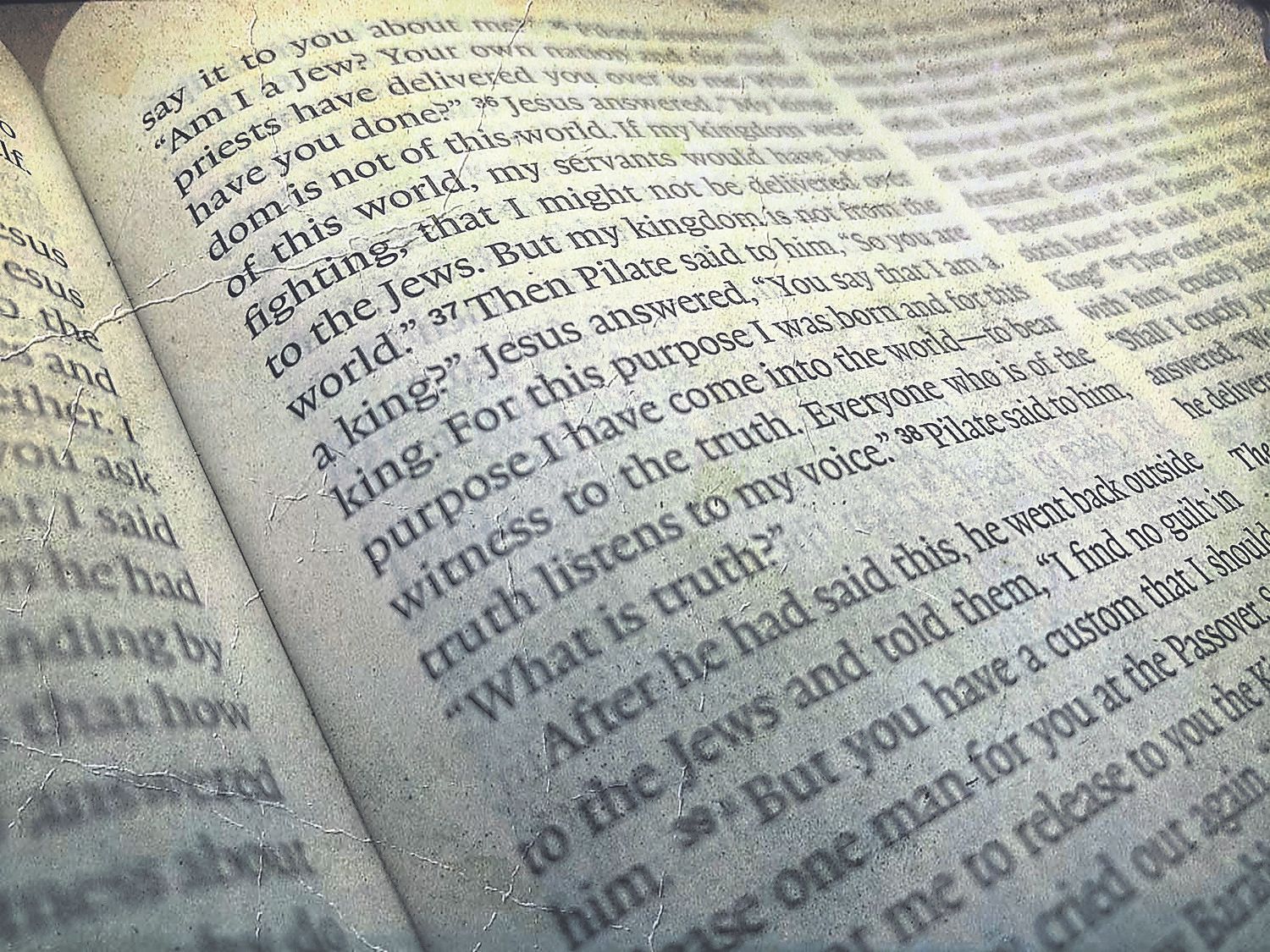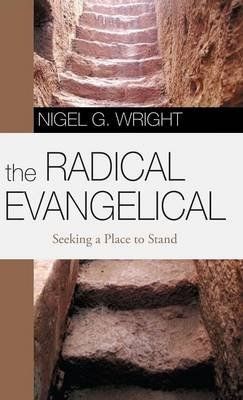A few weeks ago, a friend sent me a copy of The Radical Evangelical, by Nigel Wright1. Although written five years ago, this is an important book for two reasons.
Firstly, it purports to examine the nature of evangelical theology, and seeks to deal with areas of persistent disagreement and controversy (e.g. the status of the Bible, the nature of the atonement, the fate of the unevangelised, and the doctrine of hell).
Secondly, according to the blurb, the author ‘offers a new way forward which remains committed to the fundamentals of the faith, while retaining a flexible response to the challenges of the future’.
If this book is a pointer to current trends in British Evangelicalism, there is cause for great concern.
Middle course
Nigel Wright is a senior church leader who has years of experience in the pastoral ministry. He has lectured in Christian Doctrine at Spurgeon’s College, and is its current Principal.
This is not, therefore, the work of a young radical who has just arrived on the theological scene, but rather represents the considered views of a man of experience.
In adopting the term ‘Radical Evangelical’, Wright states that he is seeking to steer a middle course between ‘fundamentalism’ and ‘liberalism’. At first sight this suggests that he is veering towards something like conservative Evangelicalism. But this is not the case. Wright is often critical of this view and adopts a position far to the left of the evangelical ‘centre ground’.
In these articles I will examine his position on four major doctrines: Scripture, Christ, redemption and divine judgement.

The Bible
Rather than affirming that Scripture is the revelation of God, Wright defends the view that the Bible bears witness to divine revelation. He writes: ‘The approach which I here espouse assesses the Bible according to its primary function of bearing witness to God … The Bible is best understood as a “cumulative process of events and their interpretation”. God is active in history and by the inspiration of the Spirit the witnesses to those acts have perceived their meaning and borne their testimony’ (p.47; emphasis added).
The danger of representing Scripture as a witness to divine revelation rather than divine revelation itself is that it focuses on the human authors of Scripture rather than the Holy Spirit who inspired them. Furthermore, it opens the door to the assertion that the Bible contains human imperfections, which must be ‘weeded out’ by means of biblical criticism.
Trustworthiness
When he comes to deal with the historical trustworthiness of Scripture, Wright affirms that although the Bible ‘bears witness’ to God’s past activity, this does not mean that all the events narrated in Scripture really happened.
He writes: ‘Stories, even ones which never actually happened, can be effective vehicles of truth’ (p. 49). Wright defends this statement by referring to the parable of the Good Samaritan, affirming that the value of the story does not depend on whether or not a man really made a journey to Jericho.
He then seeks to apply this principle to texts such as Genesis 2-3, Jonah and Daniel, contending that these should not be treated as factual accounts. The fundamental flaw in his argument, of course, is that Scripture nowhere suggests that these texts are to be read as parables!
It also undermines his own thesis that the biblical writers were ‘bearing witness’ since if the events recorded did not actually happen, there was nothing to bear witness to.

Biblical criticism
Wright recognises that conservative Evangelicals accept, among other things, ‘the Mosaic authorship of the Pentateuch, the unity of Isaiah, an early date for the Book of Daniel, the entire historicity of the Fourth Gospel, and the Pauline authorship of the Pastoral Epistles’ (p. 10).
Wright, however, wishes to distance himself from such views. He states: ‘New Evangelicals have been more able to discriminate in the scholarly debates between what is of importance and what of relative indifference and have tended to advance mediating positions which accept the insights of modern critical study of the Bible without denying the essence of what conservative Evangelicalism has stood for’ (p. 10).
In other words, believers may now happily deny such things as the Mosaic authorship of the Pentateuch and the historical accuracy of the Gospel of John and still be considered Evangelicals.
In making this affirmation, Wright employs a subtlety that is increasingly prevalent in the contemporary evangelical scene. He implies that since such things as the authorship of the Pentateuch are not importantin terms of our salvation, we are allowed to reject them, as long as we remain faithful to the perceived essentials of the gospel.
Sadly, the history of the church in the UK during the 19th century shows that accepting the findings of such biblical criticism paves the way for theological liberalism.
The concept of Christ
Since Jesus accepted the Mosaic authorship of the Pentateuch and the historicity of Jonah, Wright’s denial of these raises questions regarding his doctrine of Christ.
He affirms the deity of Christ but makes confusing statements regarding Christ’s humanity. He correctly affirms the full humanity of Christ, but argues that being human implies the propensity to err.
Applying this to Christ, Wright concludes: ‘There should therefore be no difficulty in acknowledging that Jesus was capable of innocent mistakes‘ (p. 83; emphasis added).
Before looking at the ‘mistakes’ Jesus is supposed to have made, we must notice the theological argument Wright uses. He reasons that unless we concede that Jesus could make mistakes, we are guilty of ‘making his humanity apparent rather than real’ (p. 83).
Wright’s analysis, however, is completely invalid. Although to err is human, it is not intrinsic to human nature. Thus it does not follow that Christ’s humanity means that he made mistakes.
The author further affirms: ‘[Christ] is the expression of the divine freedom which includes the capacity to achieve its purpose even through assuming human limitations and weakness; he is the manifestation of the divine wisdom which can pursue its purpose successfully even by surrendering itself for humanity’s sake to the capacity for innocent mistakes’ (p. 83).
This statement indicates that in seeking to avoid the Scylla of doceticism, Wright falls foul of the Charybdis of the ‘kenotic’ hypothesis, which effectively denies the full deity of Christ.
Mistakes?
What, then, are the ‘innocent mistakes’ Christ is supposed to have made? Wright presents two examples. The first is Mark 2:26-27, where Christ affirms that David ate the consecrated bread in the days of Abiathar the high priest, whereas 1 Samuel 21:1-6 indicates that his father Ahimelech was the ‘priest’ at the time.
In fact, what Jesus said was wholly correct. The event did take place ‘in the days’ of Abiathar, who was present when David ate the shewbread. He escaped the ensuing slaughter of the priests and became high priest, so could properly be identified as ‘Abiathar the high priest’.
The second example is Matthew 23:35, where Jesus states that Zechariah was the son of Berechiah, whereas according to 2 Chronicles 24:20-21 Zechariah was the son of Jehoida. However, Christ’s reference may well have been to an entirely different martyrdom, that of the prophet Zechariah, son of Berechiah (although there is no independent record that he died in this way).
These examples lead Wright to conclude: ‘On the face of it, it looks as though Jesus has made here two simple and innocent mistakes of detail similar to those that most of us make every day of our lives’ (p. 84).
Improbable
Despite hedging his conclusion with the phrases ‘on the face of it’ and ‘it looks as though’, Wright does not hesitate to affirm that Christ erred. Although he accepts there may be explanations for these apparent errors, Wright rather patronisingly dismisses these, saying: ‘The most honest approach, unless we are determined by all means possible to maintain an a priori assumption that Jesus could never have been wrong about anything, is to accept the most obvious interpretation and agree that Jesus, apparently, was capable of innocent mistakes’ (p. 85).
The two examples are, in fact, highly improbable. The Gospels present Jesus as someone who knew the Scriptures in great detail. Would someone with such a detailed knowledge of the Old Testament make the simple factual mistakes Wright suggests?
Is it not far more probable that Wright is using these two examples to substantiate his own a priori assumption that Christ’s humanity implies he was fallible?
Christ’s mission
If these allegations were correct, of course, it would have major implications for Christ’s role as teacher. Wright is aware of this, and anticipates certain objections: ‘I am asserting that as the faithful and true witness to his Father, Jesus speaks truly, accurately and with authority on those things central to his mission, but that this does not imply he was incapable of innocent mistakes in other areas’ (p. 84). Such an assertion, however, faces four major difficulties.
Firstly, how do we establish what things are ‘central to his mission’? Any attempt to separate ‘central’ matters from ‘peripheral’ is both subjective and fraught with problems.
Secondly, if Jesus’ humanity rendered him liable to mistakes, on what basis is he reliable on matters pertaining to God and salvation? If Wright answers ‘because he is God’, does this not effectively contradict his whole argument?
Thirdly, if we can show that Jesus erred in some matters, does that not make us superior to Christ in those areas of knowledge in which Jesus erred?
Fourthly, if Christ himself could err in the biblical records, where does that leave the other authors of Scripture such as Paul and Peter? What is left of the New Testament?
Clearly, Wright’s dalliance with modern biblical criticism is a slippery slope. Next month we shall consider his understanding of redemption and divine judgement.
Reference
1. Nigel Wright, The Radical Evangelical: Seeking a Place to Stand (London: SPCK, 1996).







